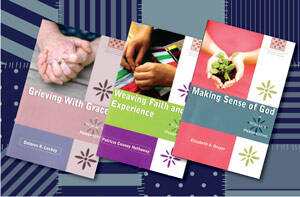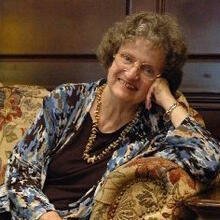The series titled “Called to Holiness: Spirituality for Catholic Women,” from St. Anthony Messenger Press, is an adventurous treatment of the spiritual life. The theologian Elizabeth A. Dreyer is general editor of the eight-volume paperback series. The books are not based on an unexamined notion that women are somehow “more spiritual.” Instead, the series takes a broad, theologically grounded view that women are well suited to do theology and spirituality through study, reflection, biblical formation, prayerfulness and worship, depth of experience and a sharp sense of social conscience. “Take a couple of deep breaths,” Dreyer suggests. “Close your eyes and open your mind and heart. Slowly, deliberately, and with a quiet confidence say: ‘I am a theologian.’”
Dreyer is developing what she calls a “grassroots theology,” in which everyone can participate. Part of the task is to weigh one’s own experience against the received tradition in which one has been raised. “How do our thoughts, values and behaviors align with the wisdom of the tradition to which we have given assent in faith?” Dreyer asks.
The editors and authors have designed this series for Catholic women, partly because women are typically more active in the church. But it is to be hoped that men will dip into these books as well. Each one is a brief but substantial treatment of spirituality from a woman’s perspective. Every 100-page volume is also practical, offering reflection questions, prayers, rituals and additional readings on each theme.
The series takes for granted that readers, including Catholic women, are already practicing the spiritual life. The authors focus on how their development is and should be proceeding today. In Making Sense of God, Dreyer, a widely known theologian who is a professor of religious studies at Fairfield University, lays out a framework for spiritual theology. She overturns any longstanding popular supposition of a division between head and heart. Both theology and spirituality, in her view, will rely on reason and thought as well as on love and compassion. With careful argumentation and long-held convictions, Dreyer forges a tight, intelligent framework for the discussion, not only in her own first volume, but anticipating those that follow.
Unlike some treatments of the spiritual life, the “Called to Holiness” series does not focus on particular spiritual practices, like retreats, Bible study and spiritual direction. Though spiritual practices are mentioned, everything from the rosary to eucharistic adoration and the Stations of the Cross, the how-to of Catholic spiritual life is largely assumed.
Each volume is thematic and focuses on a different aspect of spirituality: Awakening to Prayer (the last of the series) by Clare Wagner, moves way beyond conventional instruction in prayer to examine such themes as noticing, awakening, thirsting, nurturing, struggling and transforming. Wagner is a Dominican Sister of Sinsinawa who lives in Madison, Wis. She is widely known as a spiritual director—both trainer and practitioner—and for her work as a retreat leader.
Grieving With Grace (Dolores R. Leckey) explores faith-filled recovery from the loss of a beloved spouse. Living a Spirituality of Action (Joan Mueller) charts a spirituality of social justice and compassion. Michelle A. Gonzalez examines her own culture and spirituality in Embracing Latina Spirituality. Sidney Callahan explores many ways of nurturing in Creating New Life, Nurturing Families. Patricia Cooney Hathaway examines the life cycle and especially the middle years in Weaving Faith and Experience. The youthful search for meaning and identity is handled by Beth M. Knobbe. While I read the titles as a sequence, each one stands on its own.
Are these books feminist in approach? Yes and no. They are certainly not contentious, and they don’t engage in controversy. But the authors intend to correct a longstanding imbalance. Claire Wagner writes in Awakening to Prayer:
…you may want to say, as I do, that certain things over the centuries of religious development have pushed women to the edge of belonging, if not separation. A system that has prevailed in society has prevailed in our church, and that is a system of domination and hierarchical dualism. For many centuries, the prevalent image of God was that of a sovereign male, demanding and distant, possibly frightening and judgmental, definitely patriarchal….in many church circles around the globe, that patriarchal image prevails to this day.
Wagner’s book is not just about the feminist struggle; even so she points out ways that women have been hemmed in by masculine assumptions.
Dreyer voices a similar concern— that women in Western cultures should take a global look: “When we cast our eye beyond the women of our own nation, it takes but a split second to realize that the majority of the world’s poor and oppressed are women.” She voices this in a preface that frames every book in the series. Despite this fundamental viewpoint I find the books more reflective than argumentative. They are not tracts but theological statements. Women’s gifts and their right to equality are assumed in a way that shapes the series overall. Typical of this evenhandedness is Callahan’s spiritual advice: “Society offers conflicting opinions on feminism.... Name one of your strongest convictions on this topic and explain your position. What further questions do you still have?”
One of the most instructive volumes in the series is Leckey’s Grieving With Grace. This diary of the author’s passage through a time of loss is moving and concrete. Dated journal entries capture the experience of certain days. Yet Leckey’s approach opens up the rich rewards of Catholic spiritual practice. The blessing of the liturgical year—Advent, Lent, ordinary time and the feast days of the saints—is reflected in the author’s life events. Leckey, a popular author and a senior research fellow at the Woodstock Theological Center, honors spiritual direction as a way of gathering fruit and insight from a lifelong relationship to God.
An encouraging look at social justice work is offered in Living a Spirituality of Action. Its author, Joan Mueller, a member of the Franciscan Sisters of Joy and a professor of theology and Christian spirituality at Creighton University, takes for granted that social commitment is not easy. Her constant reference to Jesus and his disciples is reassuring. She dips into biblical stories in ways that renew our courage and sense of purpose. Her concern is for spirituality as staying power against the huge challenge of poverty and violence. Mueller provides a satisfying answer to the frequently heard cry, “What can one person do?” The woman who practices a spirituality of action relies on the support of an extended community of like-minded believers. She peppers her book with vivid wisdom sayings: “Plan carefully,” “Understand that failure is part of the process,” and “Work against grumpiness.”
Finding My Voice, by Beth M. Knobbe, is an engaging treatment of youthful self-discovery and the development of a sense of identity and calling. Knobbe explores such matters as love, intimacy, sex, friendship, commitment and the dignity of the person. She has a clear moral vision and a personal relationship with God that she expresses in a fresh, straightforward style. Knobbe, who has worked extensively with young people as a campus minister at the Sheil Catholic Center of Northwestern University, raises perennial questions: “Who am I really?” “Where am I going?” “How will I make a difference?” Even more impressive, she deals with the formation of a mature social conscience.
The interplay between culture and spirituality is very clear in Embracing Latina Spirituality. Michelle A. Gonzalez takes pride in her origins and Catholic formation. An accomplished theologian and author who teaches at the University of Miami, Gonzalez spent two years in a Mayan community in Guatemala. She has also engaged in Afro-Cuban studies and published a book on Sor Juana Inés de la Cruz. She treasures the strong sense of family she finds in the Latin community and sees it as a resource for all Catholics. Gonzalez honors the simple faith expressed by conversing with the saints and with Mary, lighting candles and leaving flowers beside their statues. Dealing with such beliefs as “the evil eye,” Gonzalez shows herself to be in tension with the culture she loves. Still, she wants us to embrace the “folk Catholicism” in our own histories. Her chapter on Marian devotion sees Mary as a source of Latina empowerment. Gonzalez works with a light touch to help readers value the concrete materiality of sacramental faith.
Sidney Callahan takes on a large challenge in Creating New Life, Nurturing Families. With the title of distinguished scholar at the Hastings Center, Callahan is widely known as a commentator on literature, psychology and faith. Here she deals with generativity and marriage, parenting and work, and, finally, the meaning of suffering. She negotiates this vast territory with confidence:
Women of faith can also receive glimpses of light and the gift of joy in the midst of the suffering and struggle of everyday life. While pain and suffering are real and not an illusion as some thinkers have asserted, joy can be present in the midst of pain.
The author draws not only from formal disciplines but also from her lived experience. She and Daniel Callahan, married in 1954, are the parents of six children and grandparents of four. Especially satisfying is the upbeat tone of her spiritual counsels: “Where, in your family life, have you experienced healing?” “Make a list of heroines in your life.” “Create a short gratitude list and take a moment to dwell on each item in prayer.”
In Weaving Faith and Experience, Patricia Cooney Hathaway takes a look at the life cycle, with special emphasis on the later years. Hathaway is associate professor of spirituality and systematic theology at Sacred Heart Major Seminary in Detroit, Mich. Her volume deals with the seasons of adult life, especially the seasons of a woman’s life. Hathaway treats each season thoroughly, drawing on insights from psychologists and spiritual writers. Two sections are devoted to autumn—the middle years—one to the spring and summer of life (young adulthood) and one to the winter of life. Her discussion of integrity versus despair, in which she examines Erikson’s idea of “the consolidation of life,” and the search for wisdom in the later years is impressive. This wisdom is born out of struggle, to review one’s past accomplishments and failures, to forgive oneself and others. “Can we acknowledge our own guilt, sadness and remorse for the hurt we have caused others and even ourselves and ask for forgiveness? To do so is to allow the psyche to heal....” Hathaway says this process is helped by Christian belief in a compassionate, loving God, and she mentions Billy Graham as an example of the trustful faith that is needed for this “consolidation” process.
In dealing with the later years, Hathaway reflects on three major mystical writers: Teresa of Avila, John of the Cross and Bernard of Clairvaux. I was glad to find a diagram of Teresa’s Interior Castle, a fitting counterpoint to the life-cycle charts shown earlier in the book. It’s clear that wisdom discovered in earlier centuries is still pure gold.
The “Called to Holiness” series lends stature to spirituality. It has structure, weight and theological insight. Each of these eight female perspectives shows the interplay of theology, spirituality, philosophy and psychology. Together they demonstrate the root meaning of holiness: wholeness, well-being and health.
Do women as theologians have something to say to the church at large? This fine series of books shows that they do.








